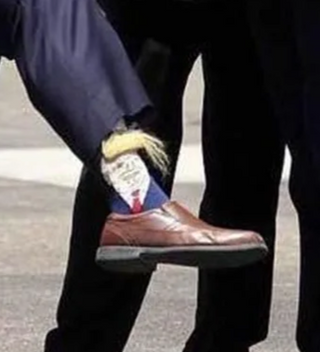CNN confirmed they would host the first debate of 2024 on that date at 9pm ET from the crucial battleground state of Georgia.
On Wednesday morning, Biden said in a video shared on social media: “Donald Trump lost two debates to me in 2020, and since then he hasn’t shown up for a debate. Now he’s acting like he wants to debate me again. Well, make my day, pal. I’ll even do it twice.
He then jabbed: “So let’s pick dates, Donald. I hear you’re free on Wednesdays,” referring to the free day in Trump’s current campaign finance violations trial in New York.
Biden’s proposal bucked a tradition of three debates, typically held in the fall, that are organized by the bipartisan Commission on Presidential Debates. Democratic party officials said in a release on Wednesday that moving the timing up, reducing the number of debates, and ending them sooner reflected changes in the “structure of our elections and the interests of voters”.
The Democrats’ proposal also noted that debates in previous elections cycles had not concluded until after early voting started and the commission’s debates were “structured like an entertainment spectacle and not a serious exchange of ideas that reflect the enormous stakes of the election”.
The commission “has consistently demonstrated an inability to enforce their own rules” in the debates and called for a firm time-limit on answers, and alternate turns to speak “so that the time is evenly divided and we have an exchange of views, not a spectacle of mutual interruption”.
Later on Wednesday morning, Trump accepted Biden’s offer to debate him in June and September, telling Fox News Digital that “it is time for a debate to take place – even if it has to be held through the offices of the Commission on Presidential Debates, which are totally controlled by Democrats and who, as people remember, got caught cheating with me with debate sound levels”.
He added on Truth Social: “Crooked Joe Biden is the worst debater I have ever faced – he can’t put two sentences together.”
That missive concluded with Trump saying: “I would strongly recommend more than two debates and, for excitement purposes, a very large venue, although Biden is supposedly afraid of crowds – That’s only because he doesn’t get them. Just tell me when, I’ll be there. Let’s get ready to Rumble!!!”
Biden volleyed back a message on X shortly after Trump’s various remarks, saying he’s up “for a debate on June 27th. Over to you, Donald. As you said: anywhere, any time, any place.”
Arranging the presidential debates has become increasingly vexed, with both parties seeking a competitive advantage. But they are considered highly important in gaining the attention of crucial swing voters who may only then be tuning in to the choice of candidates.
While not mandated in any constitutional sense, they are now considered an intrinsic part of the election process. But even the Democrats’ proposal on Wednesday was designed for point-scoring.
“As Donald Trump has said he will debate ‘anytime, anywhere’, we hope both campaigns can quickly accept broadcast media debate invitations on the parameters above,” the Biden campaign chair, Jen O’Malley Dillon, wrote in a letter to the commission, prior to Trump’s acceptance of the challenge. “Americans need a debate on the issues – not a tedious debate about debates.”
The Biden campaign had said it would work directly with news organizations to set up the debates, sidelining the debating commission which has overseen them since 1988. In CNN’s press release announcing the 27 June debate, they note it will take place “in CNN’s Atlanta studios” and have “no audience will be present”.
Until now, there has been uncertainty about whether Biden would agree to debate Trump at all. Trump skipped every Republican primary debate, pointing to his polling lead in that selection process, and Biden refused to debate his Democratic challengers.
Trump, who has polling leads in five of six crucial swing states, has goaded Biden often, saying last month he was willing to debate his rival “anytime, anywhere, any place”, starting “now”.
The Trump campaign called for presidential debates to be held earlier and more frequently so voters “have a full chance” to see the candidates in action and argued that by the time of the first scheduled debate, on 16 September, more than 1 million Americans will probably have already voted, with more than 8.7 million voting by the third debate, penciled in for 9 October.
Last month, 12 US news organizations issued pleas to the campaigns to agree to TV debate schedule.
“If there is one thing Americans can agree on during this polarized time, it is that the stakes of this election are exceptionally high,” the organizations including ABC, CBS, CNN, Fox News, PBS, NBC, NPR and the Associated Press said in a statement.
“Amidst that backdrop, there is simply no substitute for the candidates debating with each other, and before the American people, their visions for the future of our nation,” they added.
In 2020, Biden and Trump debated twice, with a third debate canceled after Trump tested positive for Covid-19.
I hope you appreciated this article. Before you move on, I wanted to ask if you would consider supporting the Guardian’s journalism as we enter one of the most consequential news cycles of our lifetimes in 2024.
With the potential of another Trump presidency looming, there are countless angles to cover around this year’s election – and we'll be there to shed light on each new development, with explainers, key takeaways and analysis of what it means for America, democracy and the world.
From Elon Musk to the Murdochs, a small number of billionaire owners have a powerful hold on so much of the information that reaches the public about what’s happening in the world. The Guardian is different. We have no billionaire owner or shareholders to consider. Our journalism is produced to serve the public interest – not profit motives.
And we avoid the trap that befalls much US media: the tendency, born of a desire to please all sides, to engage in false equivalence in the name of neutrality. We always strive to be fair. But sometimes that means calling out the lies of powerful people and institutions – and making clear how misinformation and demagoguery can damage democracy.
From threats to election integrity, to the spiraling climate crisis, to complex foreign conflicts, our journalists contextualize, investigate and illuminate the critical stories of our time. As a global news organization with a robust US reporting staff, we’re able to provide a fresh, outsider perspective – one so often missing in the American media bubble.
Around the world, readers can access the Guardian’s paywall-free journalism because of our unique reader-supported model. That’s because of people like you. Our readers keep us independent, beholden to no outside influence and accessible to everyone – whether they can afford to pay for news, or not.
Betsy Reed
Source and credit to: https://www.theguardian.com/us-news/article/2024/may/15/biden-trump-debate-date



















